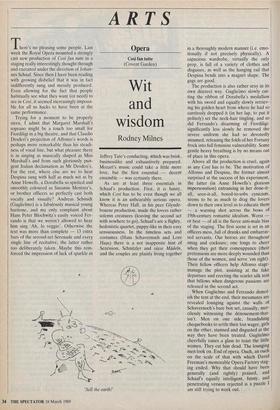ARTS
Opera
Cosi fan tutte (Covent Garden)
Wit and wisdom
Rodney Milnes
here's no pleasing some people. Last week the Royal Opera mounted a strongly cast new production of Cosi fan tutte in a staging really interestingly thought through and executed under the direction of Johan- nes Schaaf. Since then I have been reading with growing disbelief that it was in fact indifferently sung and messily produced. Even allowing for the fact that people habitually see what they want (or need) to see in Cosi, it seemed increasingly impossi- ble for all us hacks to have been at the same performance.
Trying for a moment to be properly stern, I admit that Margaret Marshall's soprano might be a touch too small for Fiordiligi in a big theatre, and that Claudio Desderi's projection of Alfonso's words is perhaps more remarkable than his steadi- ness of vocal line, but what pleasure there is in singing as musically shaped as Miss Marshall's and from such gloriously pun- gent Italian declamation as Mr Desderi's. For the rest, where else are we to hear Despina sung with half as much wit as by Anne Howells, a Dorabella so spirited and smoothly coloured as Susanne Mentzer's, or brother officers so perfectly cast both vocally and visually? Andreas Schmidt (Guglielmo) is a fabulously musical young baritone, and my only complaint about Hans Peter Blochwitz's easily voiced Fer- rando is that we weren't allowed to hear him sing `Ah, lo veggio'. Otherwise the text was more than complete — 13 extra bars of the second-act Serenade and every single line of recitative, the latter rather too deliberately taken. Maybe this rein- forced the impression of lack of sparkle in Jeffrey Tate's conducting, Which was brisk, businesslike and exhaustively prepared. Mozart's music could take a little more love, but the first essential — decent ensemble — was certainly there.
As are at least three essentials in Schaaf's production. First, it is funny, which Cosi has to be even though we all know it is an unbearably serious opera. Whereas Peter Hall, in his peer Glynde- bourne production, made the lovers rather solemn creatures (leaving the second act with nowhere to go), Schaaf's are a flighty, hedonistic quartet, puppy-like in their easy sensuousness. In the timeless sets and costumes (Hans Schavernoch and Lore Haas) there is a not inapposite hint of Sezession, Schnitzler and siisse Mddeln, and the couples are plainly living together
`Sell the earth!' in a thoroughly modern manner (i.e. emo- tionally if not precisely physically). A capacious wardrobe, virtually the only prop, is full of a variety of clothes and disguises, as well as the hanging rail that Despina bends into a magnet shape. The gags are good.
The production is also rather sexy in its own discreet way. Guglielmo slowly cut- ting the ribbon of Dorabella's medallion with his sword and equally slowly retriev- ing his golden heart from where he had so carelessly dropped it (in her lap, to put it politely) set the neck-hair tingling, and so did Ferrando's disarming of Fiordiligi: significantly less slowly he removed the severe uniform she had so devotedly assumed, releasing the folds of her Fortuny frock into full feminine vulnerability. Some gentle heavy breathing is by no means out of place in this opera.
Above all the production is cruel, again as any Cosi has to be. The motivation of Alfonso and Despina, the former almost surprised at the success of his experiment, the latter (in Anne Howells's glorious impersonation) entrancing in her done-it- all, seen-it-all, bored-to-sobs cynicism, seems to be as much to drag the lovers down to their own level as to educate them — a warning shot across the bows of 19th-century romantic idealism. Worst or best — of all is the fierce anti-male bias of the staging. The first scene is set in an officers mess, full of drunks and embarras- sed servants. Our heroes are throughout smug and cocksure; one longs to cheer when they get their comeuppance (their pretensions are more deeply wounded than those of the women, and serve 'em right). Their fellow officers help Alfonso stage- manage the plot, assisting at the fake departure and erecting the scarlet silk tent that billows when dangerous passions are released in the second act.
When Guglielmo and Ferrando demol- ish the tent at the end, their messmates are revealed lounging against the walls of Schavernoch's bare box set, casually, mer- cilessly witnessing the denouement-that- isn't. Men on one side, brandishing chequebooks to settle their lost wager, girls on the other, stunned and disgusted at the way they have been treated. Guglielmo cheerfully raises a glass to toast the little women. They cut him dead. The lounging men look on. End of opera. Ouch, an ouch on the scale of that with which David Freeman's memorable Opera Factory stag- ing ended. Why that should have been generally (and rightly) praised, and Schaaf's equally intelligent, funny, and penetrating version rejected is a puzzle I am still trying to work out.


























































 Previous page
Previous page